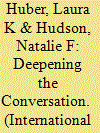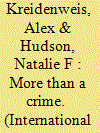| Srl | Item |
| 1 |
ID:
169243


|
|
|
|
|
| Summary/Abstract |
Scholarship on international police reform and Women, Peace and Security (WPS) has flourished in the last decade and the potential for engagement across these two bodies of literature is promising. Given the increased use of police personnel in international peace missions and emphasis on gender mainstreaming policies, the need for assessing the impact of these two trends has never been greater. Thus, this paper seeks to bridge gaps between the mainstream policing scholarship and feminist scholars focused on post-conflict peacebuilding police reforms. We explore how feminist scholars can engage with policing literature’s technocratic language and ‘in the field’ experience as well as how policing scholars can interact with feminist scholars to transform traditional approaches to security in the context of the WPS Agenda. We demonstrate the benefits of increased dialogue and interaction by highlighting the common and diverging challenges in both fields in three areas: the design, implementation, and evaluation. Finally, to illustrate the dynamic intersection of these areas of study and practice, we examine the transnational policing efforts to gender mainstream the Liberian National Police (LNP) in the context of the UN Mission in Liberia (UNMIL).
|
|
|
|
|
|
|
|
|
|
|
|
|
|
|
|
| 2 |
ID:
137607


|
|
|
|
|
| Summary/Abstract |
Using the case of anti-trafficking policy in Ohio, this paper examines the emergence and impact of localized policy efforts against the global phenomenon of human trafficking. We argue that the manner in which human trafficking is characterized by international and national policymakers has engendered flawed policy approaches. Specifically, we find that local actors have replicated wholesale the discourse and policy frames developed and adopted by international organizations and national governments. While well intentioned, current characterizations and the subsequent policies have uniformly failed to stem the time of human trafficking even at the local level. Therefore, we examine the human security approach as an alternative means to describe and frame human trafficking and suggest that such a political discourse has the potential to prescribe more effectual policies against human trafficking.
|
|
|
|
|
|
|
|
|
|
|
|
|
|
|
|